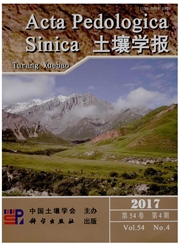

 中文摘要:
中文摘要:
基于中国科学院红壤生态实验站花生连作障碍长期试验点(1996年~2008年),研究了长期不同施肥对连作花生土传病害、生物学性状和产量的影响。结果表明:长期不同施肥,各处理花生土传病害均有发生,其中施用有机肥(M)、有机肥+有效菌剂(BM)和有机肥+有效菌剂+微量元素(BMT)发病率显著低于施用化肥(F)和化肥+微量元素(TF)。连作条件下长期不同施肥,花生株高、植株干重和荚果产量总体上呈下降趋势,连作时间越长,下降越严重,但施用有机肥(M)、有机肥+菌剂(BM)和有机肥+菌剂+微量元素(BMT)无论花生生物学性状还是产量均显著高于施用化肥(F)和化肥+微量元素(TF)的处理,有机肥以及有机肥配施有效菌剂对减轻花生土传病害、延缓产量降低和生物性状变劣表现出一定的效果。施用微量元素对减轻花生病害发生没有作用。通过花生荚果产量与土传病害发病率相关性分析表明,两者之间呈极显著负相关,连作花生土传病害是花生连作障碍的主要因子。
 英文摘要:
英文摘要:
Based on a long-term stationary experiment on problems in continuous monocropping of peanut from 1996 to 2008 in the Ecological Experimental Station of Red Soil, Chinese Academy of Sciences, effects of fertilization on plant growth, yield and incidence of soil-borne diseases of peanut were studied. Soil-borne disease occurred in all the fields under continuous monocropping in 2008, while the incidence was lower in Treatments M (organic manure) , BM (organic manure + effective microorganisms) and BMT ( organic manure + effective microorganisms + trace materials) than in Treatments F (chemical fertilizer) and TF (chemical fertilizer + trace materials) in the same year. No matter what fertilizer was applied, continuous monocropping decreased height, weight and yield of peanut, and the effect became more severe over time. Peanuts were obviously better in growth and yield in Treatments M ,-BM and BMT than in Treatments F and TF. Application of organic manure and effective microorganisms decreased the incidence of soil-borne diseases, deferred the declining trend of pod yield and improved plant growth, while the application of microelements did not have such effects. A significant negative correlation between pod yields and disease incidence indicated that soil-borne diseases is one of the main obstacles to continuous monocropping of peanut.
 同期刊论文项目
同期刊论文项目
 同项目期刊论文
同项目期刊论文
 Phenanthrene adsorption by soils treated with humic substances under different pH and temperature co
Phenanthrene adsorption by soils treated with humic substances under different pH and temperature co Degradation of benzo[a]pyrene in an experimentally contaminated paddy soil by vetiver grass (Vetiver
Degradation of benzo[a]pyrene in an experimentally contaminated paddy soil by vetiver grass (Vetiver Copper uptake by four Elsholtzia ecotypes supplied with varying levels of copper in solution culture
Copper uptake by four Elsholtzia ecotypes supplied with varying levels of copper in solution culture Effect of copper-tolerant rhizosphere bacteria on mobility of copper in soil and copper accumulation
Effect of copper-tolerant rhizosphere bacteria on mobility of copper in soil and copper accumulation Distribution patterns of polychlorinated biphenyls in soils collected from Zhejiang province,east Ch
Distribution patterns of polychlorinated biphenyls in soils collected from Zhejiang province,east Ch Occurrence and congeners specific of polychlorinated biphenyls in agricultural soils from Southern J
Occurrence and congeners specific of polychlorinated biphenyls in agricultural soils from Southern J Distribution patterns of polycyclic aromatic hydrocarbons among different organic carbon fractions o
Distribution patterns of polycyclic aromatic hydrocarbons among different organic carbon fractions o Bioremediation of polycyclic aromatic hydrocarbons contaminated soil with Monilinia sp.: degradation
Bioremediation of polycyclic aromatic hydrocarbons contaminated soil with Monilinia sp.: degradation Determination of Ethylenediaminedisuccinic acid in Soils and plants using reversed phase High perfor
Determination of Ethylenediaminedisuccinic acid in Soils and plants using reversed phase High perfor Residues of DDTs and their spatial distribution characteristics in soils from the Yangtze River Delt
Residues of DDTs and their spatial distribution characteristics in soils from the Yangtze River Delt Distribution of polycyclic aromatic hydrocarbons in particle-size separates and density fractions of
Distribution of polycyclic aromatic hydrocarbons in particle-size separates and density fractions of Potential role of polycyclic aromatic hydrocarbons(PAHs) oxidation by fungal laccase in the remediat
Potential role of polycyclic aromatic hydrocarbons(PAHs) oxidation by fungal laccase in the remediat 期刊信息
期刊信息
